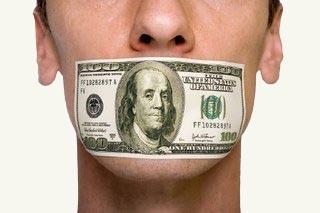There’s a drama playing out on American TV screens. It features villains and heroes, as well as big bucks and political intrigue. There may even be a happy ending by the time we see the turbulent finale.
But the plot is unfolding off-screen, in corporate boardrooms and the corridors of political power. It’s the story of what viewers aren’t seeing this election year.
Americans are certainly watching plenty of political ads. One viewer in Iowa told me that she had to go on a strict TV diet during the state’s presidential caucus to stop the gusher of political misinformation flowing into her home.
But we’re not receiving enough of the antidote: the kind of news and information that would allow us to make informed choices come Election Day. The real story is about the threat that commercial broadcast media pose to the most important act in a democracy: voting.

TV remains the nation’s most influential communications medium. According to Pew Research Center surveys, 78 percent of Americans report getting their news from local TV broadcasts on a typical day — more than the portion of the populace that relies on newspapers, radio, or the Internet.
That’s why TV is so popular with those seeking to manipulate public opinion. Wherever viewers go, so goes the money to influence their votes. Wealthy individuals and corporations are ponying up $3 billion or more for campaign ad buys across the country this year.
The Supreme Court’s 2010 Citizens United ruling, which lifted restrictions on corporate political spending and unleashed unlimited amounts of corporate cash to influence election outcomes, is one reason so much money is being spent on so many ads. The other reason is that it’s a proven formula for success.
The candidate who spent more on a campaign for a congressional seat in 2008 won the race more than nine out of 10 times, according to the Center for Responsive Politics. And spending on negative ads is particularly effective.
Reports on where money to influence elections originates are common. But few journalists or bloggers follow the billions of dollars to the trail’s end — the bank accounts of a handful of large media corporations that control local broadcast television across America. Their daily viewing audience numbers in the hundreds of millions.
The media industry even has a term for this, the “quadrennial effect.” It accounts for the surge in revenues every four years as national elections take center stage.
Among the biggest beneficiaries of the effect are Belo Corp., CBS Corp., Gannett Co, Inc., Media General News Corp., Sinclair Broadcast Group, and Media General, which all own stations in states where elections will be hotly contested.
And these same companies are doing a poor job of using their local news broadcasts to inform and engage viewers in the political process.
Despite the continuing influence of local TV newsrooms, a 2011 Federal Communications Commission (FCC) study found that many TV stations are airing very little election news or none at all. A 2010 Annenberg School report showed that in the average 30-minute local news broadcast, less than 30 seconds covers hard local government news. “If it bleeds it leads,” then-FCC Commissioner Michael Copps said at the time of the study’s release. “But if it’s democracy’s life-blood, let it hemorrhage.”
But this story has heroes as well as villains. They’re the people working together to reform election laws and the media so that they actually foster broader participation in our democracy. A lot of this action will unfold at the FCC, which is now weighing a decision to force more accessible disclosure of political ad-spending data at local TV stations. The agency is also beginning a review of media ownership to see whether or not the consolidation of broadcasters over the last three decades has harmed the public interest.
I think it has, and hope that more people will get organized to pressure the FCC to do the right thing and force more transparency and accountability on broadcasters. Fixing the media is the only way we can restore any health to an ailing election system. It’s intrinsic to achieving any of the changes our democracy needs to get well. The FCC needs to hear from you.